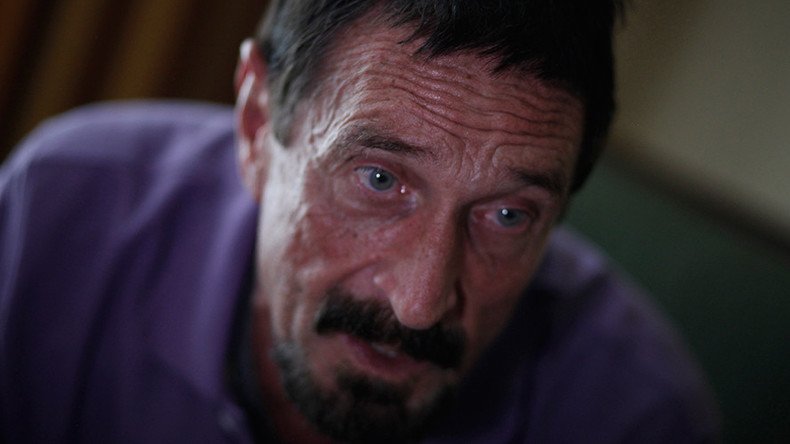‘More devastating than any nuclear war’: John McAfee on the coming cyber war with ISIS

Every presidential contender says they want to destroy Islamic State, but John McAfee is the only one predicting a war involving cyberattacks, not conventional weapons. “We have to prepare ourselves” for an enemy that is “far more clever,” McAfee told RT.
Not many people know John McAfee is running for president, but possibly even fewer understand the scope of the war against Islamic State (IS, formely ISIS/ISIL) the way he does.
When asked if Republican frontrunner Donald Trump’s strategy against IS was reasonable, McAfee answered, “No, absolutely not.” That’s an answer most other rivals would agree with, but to McAfee, it’s not about where and how to use the military. To defeat ISIS, America must face its own “cyber illiteracy” and other faults before engaging in what he purports to be the next World War – a cyber war.
“They are far more clever in cyber sciences than we ever gave them credit for,” McAfee said of IS in an interview with RT. The candidate who created his own political brand, the Cyber Party, went on to describe the terrorist group’s Amaq news application for smartphones.
“It’s basically the ISIS propaganda application which runs on Android machines. We managed to get a copy of that application. It was very difficult, because ISIS distributes the app secretly through email attachments and message attachments asking their followers to pass it on in a like manner.”
Yet the app is more than simple propaganda. It facilitates terror attacks, but of a kind mostly unseen by the mass population yet.
“We’ve discovered that inside the app, the application has the capacity to do denial-of-service attacks across the internet,” McAfee said, referring to DDoS attacks, which aim to disable or take over digital networks.
“For example, we believe that it was this application that tried to bring down the root servers of the internet last week, a massive attack – unprecedented – that we’ve never seen before,” he said. Last week, the world’s 13 internet root name servers sustained an onslaught of DDoS attacks, leaving several websites loading slower before the attackers relented.
The Dangerous Cyber Bill Threatening Our Privacy [VIDEO] https://t.co/hkIZZ2NPQt@Thom_Hartmann
— RT America (@RT_America) December 16, 2015“There’s simply no way to take everybody’s smartphone away from them. Neither is there any way to know what everybody is doing on their smartphones, so the cyber war has moved from big servers that try to attack other servers, to software that ISIS has developed, that runs on everybody’s smartphone. And keep in mind, there are 1.6 billion Muslims in the world. Fifteen to 25 percent, as current estimates, are extremists. Even if a small percentage of those are following the ISIS news app, then we have tens of millions of users of this application. It’s a very frightening situation,” McAfee said.
Asked whether there was any role for domestic mass surveillance in the effort to defeat IS, McAfee dismissed the notion entirely.
“Mass surveillance does not mean that you have the capacity to analyze the data that you’re surveilling. This is the issue,” he said. “Every day, the US government collects terabytes of information. That’s trillions of bytes of information about what’s happening, but they have no capacity to analyze that efficiently.”
“When they do find something out, it’s usually an opportunistic accident that they find something out.”
Cyber insecurity: How can hackers, whistleblowers, and privacy co-exist? [VIDEO] https://t.co/pZtmChkrtg@SimoneReports@LindsayFrance
— RT America (@RT_America) December 5, 2015McAfee, however, did not rule out surveillance for potential foreign enemies. He also noted that surveillance and spying have led to problematic meddling and intervention.
“What is the common attitude for the citizens in Iraq and Iran and Syria? What do they feel about America? What do they feel about the things that we are doing? This is what we should be finding out,” he said. “We are completely oblivious to other countries. We have terrorism, because we as Americans have played the world policeman and interfered in the affairs of foreign states for far too long.”
“Now, we can certainly find information about the outside world, so that we can know what other people are planning and react to that, but please, look at the history. Take some blame, America.”
The interview then turned to the hacker group Anonymous, which took down thousands of IS social media accounts several weeks ago. McAfee said Anonymous is “taking its toll on the ISIS cyber war.”
#McAfee launches 2016 bid, says politicians ‘illiterate’ on technology
http://t.co/bcdFnnvPscpic.twitter.com/LIaWPzvKyR
— RT America (@RT_America) September 10, 2015For example, he said that within IS’ news app, the group had assumed Anonymous had taken down their last server and was sending broadcasts asking where the most current server was. He said that while Anonymous is “definitely pushing them into a corner,” the group is unlikely to halt IS’ communications completely.
“Can they succeed in silencing them? I don’t think so, I don’t think so. There are far too many extremists, there are far too many devotees, and ISIS does have enormous technical competence in this cyber world,” McAfee cautioned.
McAfee concluded by telling RT, “We have to prepare ourselves, because the next war is not going to be fought with bombs and battleships and airplanes. It’s going to be a cyber war, far more devastating than any nuclear war.”













